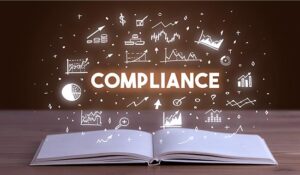This blog summarizes the key points from a recent article from David McGeough at Scorebuddy where he explores why contact centre compliance is so critical and what you can do to deliver training that sticks.
Call centre agents juggle numerous responsibilities every day. As the first line of communication with customers, they also handle sensitive information that requires careful management. This makes compliance training essential, not optional.
It’s crucial for employees to fully grasp how to safeguard customer data while staying compliant with relevant laws and regulations. While general training programs may touch on some of these topics, it’s vital to allocate time specifically for comprehensive compliance education.
Why You Need Compliance Training in Your Call Centre
The stakes for noncompliance are high:
- Financial penalties
- Legal troubles
- Harm to your reputation
- Erosion of customer trust and loyalty
For instance, Morgan Stanley faced significant consequences for data breaches in 2016 and 2019, resulting in $60 million in penalties in 2020. Later, in 2022, they were fined another $35 million over issues tied to improperly decommissioned hard drives.
On the positive side, compliance training does more than prevent these challenges. It fosters customer trust, motivates your team, and enhances your organization’s reputation.
How to Conduct Compliance Training in Call Centres: 12 Tips
1. Establish Clear Expectations
Begin by clearly outlining expectations and communicating your policies, procedures, and compliance requirements. Agents need to understand:
- The expected behaviours
- Why compliance is essential
- The regulations they must follow
Ensure these guidelines are easy to find and consistently communicated. When employees grasp the reasons behind compliance, they’re more likely to adhere to it.
2. Teach Industry Laws and Regulations
Your agents must be well versed in relevant regulations, such as GDPR, CCPA, or TCPA, along with internal policies. Break down complex terms into actionable steps and include real-life scenarios to illustrate the significance of these rules.
3. Emphasize Secure Data Practices
With over 3,200 data breaches reported in 2023 in the U.S. alone (a 77% increase from 2022), safeguarding customer data is critical. Training should focus on:
- Verifying customer identities
- Properly handling sensitive information
- Identifying security threats
4. Provide Regular Training Updates
Compliance requirements evolve, and your training should reflect these changes. Regular updates, whether through refresher courses or quick reviews, ensure agents stay informed and compliant.
5. Include Managers in Training
Supervisors play a key role in upholding compliance, so they also need thorough training. Educate them on relevant rules and provide tools to support their teams effectively while identifying risks.
6. Leverage Quality Assurance to Identify Risks
A strong QA process goes beyond tracking script usage and customer satisfaction—it’s an invaluable tool for spotting potential compliance issues early. Use the insights to provide feedback and design targeted training to mitigate risks.
7. Diversify Training Techniques
Not all agents learn the same way, so vary your training methods to maintain engagement. Try:
- Interactive role-play sessions
- Workshops
- Digital learning modules
- On-the-job training
AI tools can provide real-time feedback, allowing supervisors to address issues immediately.
8. Make Training Accessible
Ensure your materials are accessible to all agents, including those with disabilities or who speak different languages. Features like closed captions and multilingual content can significantly improve understanding.
9. Customize Compliance Scorecards
Incorporate compliance-specific criteria into your scorecards, such as critical fail items or auto-fail questions, to flag risky behaviours. This reinforces adherence and keeps compliance top of mind.
10. Use Technology to Enhance Training
Technology can streamline training delivery and tracking. For example, pairing QA tools with a learning management system (LMS) enables:
- Easier training distribution
- Progress monitoring
- Custom course creation
Regularly update your knowledge base to provide a centralized hub for compliance information.
11. Equip Agents With Updated Scripts
Scripts aren’t just for guiding conversations—they’re essential for maintaining compliance. Regular updates ensure agents always follow the latest rules. Encourage agent feedback to improve script effectiveness.
12. Focus on Industry-Specific Requirements
Tailor training to the unique rules of your sector, whether it’s GDPR in Europe, HIPAA for healthcare, or PCI DSS for payment processing. This specificity makes compliance more relevant and actionable for your team.
Measuring Compliance Training Impact
- Knowledge Tests: Assess agent understanding at various stages to identify gaps and measure improvement.
- QA Monitoring: Use QA tools to analyze agent performance and pinpoint areas for further training.
- Customer Feedback: Evaluate how compliance influences customer experience through surveys and satisfaction scores.
- Call Audits: Regular reviews of recorded calls help track compliance adherence and flag risks.
Quality Assurance: A Key Compliance Tool
Handling sensitive customer data requires robust compliance measures. As your call centre scales, so do the associated risks. Failing to address these risks can lead to fines, lawsuits, and reputational damage.
A well-structured QA process not only monitors agent performance but also provides actionable insights to enhance your compliance training and mitigate potential issues.
This blog post has been re-published by kind permission of Scorebuddy – View the Original Article
For more information about Scorebuddy - visit the Scorebuddy Website
Call Centre Helper is not responsible for the content of these guest blog posts. The opinions expressed in this article are those of the author, and do not necessarily reflect those of Call Centre Helper.
Author: Scorebuddy
Reviewed by: Rachael Trickey
Published On: 9th Dec 2024
Read more about - Guest Blogs, David McGeough, Scorebuddy






 Scorebuddy is quality assurance solution for scoring customer service calls, emails and web chat. It is a dedicated, stand-alone staff scoring system based in the cloud, requiring no integration.
Scorebuddy is quality assurance solution for scoring customer service calls, emails and web chat. It is a dedicated, stand-alone staff scoring system based in the cloud, requiring no integration. 









